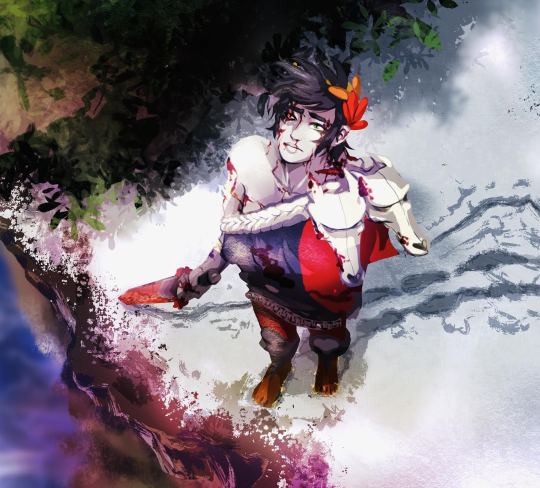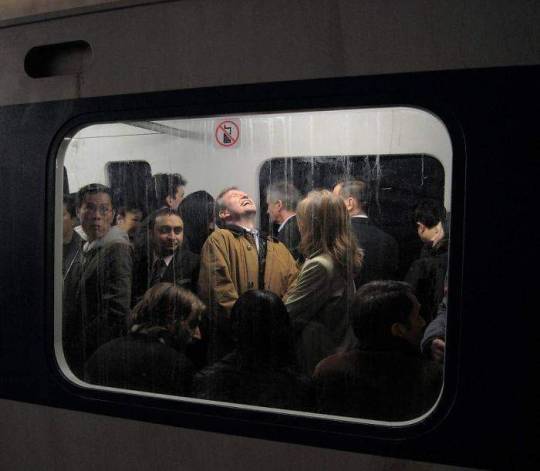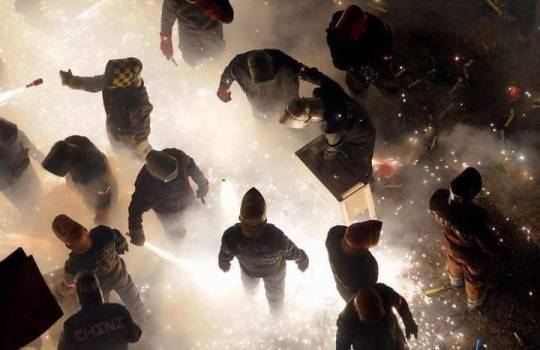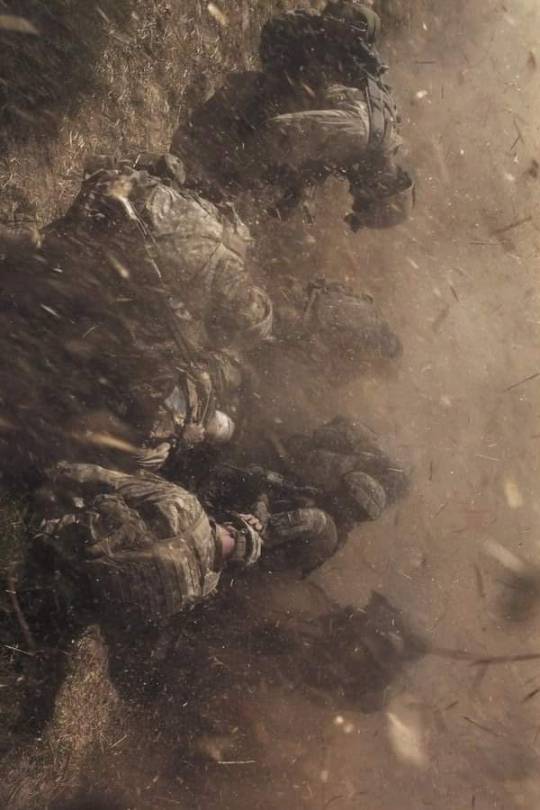Video
Attack…
86K notes
·
View notes
Note
oh these are very good
I keep spamming you with writing questions but you give such good answers with good examples but HERES ANOTHER ONE: what’s the best way to “practice” writing? Like writing exercises? Sometimes it’s hard to tell if I’m improving or not 😬
Don’t worry about spamming, hon! I never mind giving advice. Hopefully something’s helpful here; it’s kind of a grab-bag, but I've tried to recommended writing exercises sorted by what kind of skills you might be interested in practicing!
For dialogue
Transcription Activity
I described this in a little more detail here. Basically, it's an exercise where you find dialogue you like in a show/movie/anything, and try to write out how it sounds. Play with the punctuation until it reads like you hear it, and practice capturing the tone of the dialogue in your dialogue tags!
For description
Five Senses Exercise
This one's pretty straightforward! You go to a place (it can even be in your home; I know some of us still don't have a lot of variety available to us), and you write five paragraphs. Each paragraph should focus on describing how your environment interacts with one sense. What do you see? Smell? Feel (or what textures do you see around you?)? What do you taste (or what potential tastes are nearby? How would you slow down and describe these?) Hear?
People/Place Watching
Also self-explanatory (but don’t be creepy about it!). Try to describe the people who move past you in a place. What do they look like, how do they move, what stands out? Also, though, I think it's fun to try this exercise as Place Watching, rather than people-focused. How does the space you're in get interacted with--by other people? Other objects? How does the space change as you watch? How does it move, how does it evolve as you watch it (This might be harder if you're stuck in your home, but you get the gist)?
To see growth and to practice editing:
Revise an Old Piece
I find this one really fun, actually. Find an old piece of writing. I would advise picking something that feels old enough that you haven't looked at it in a while, but it's not so old that you don't feel attached to the piece anymore. Then, go back through and edit the piece so that it better reflects how you write now. I would recommended saving a separate copy to edit in, that way you can still have the original draft to compare and see your own progress (you could also use Track Changes, I suppose). You'll start noticing things that stick out, that feel wrong, that you want to express differently, that maybe didn't make sense the first time. This is a really good way of letting yourself explore how you're changing as a writer and to get a concrete look at the ways you've grown!
For the drafting process
No-Edit Timed Writes
I lowkey hate these (I like them better for reflection purposes). But oof do they make you get comfortable with putting shit down on the page and pushing past insecurity/writer's block/your editor's brain. My first writing teacher told me that you have two brains--your writer's brain and your editor's brain. Your writer's brain can't work as well and won’t stumble on something great if your editor brain is hung up on every word. So with a no-edit timed write, you're forcing yourself to shut that editor's brain entirely off. Set a timer (I’d recommend 10 min, but that’s up to you) and write. Don't go back and fix sentences. Keep moving forward. Don't go back to add anything. Just get words on the page. Try to even resist fixing typos, if you can. I'd suggest working with a prompt for this one. See how much you can get down!
Pacing
x3 Exercise (I’ve heard this called a Goldilocks exercise, which is super cute)
Try writing the same event at three different lengths—250 words, 500 words, 750 words. You'll have to condense and stretch and flesh out detail, and it'll push you to feel when you've written too little and when you've written too much. You can always follow up this exercise by trying to judge the point at which you felt you hit the right amount of description/content. Prompts can be helpful with this too.
And tbh, while I've done all of these, I don't necessarily do them often? Mostly between projects, or if I'm in a class or workshop environment, or if I'm stuck with whatever I'm working on. Figure out what practicing feels like for you! Writing a short story or even ficlets can definitely be thought of as practice if that's what works for you. What helps most is writing often, as cliché as that's become (with the caveat, of course, that writing often doesn't mean forcing yourself to neglect your mental health, life outside writing, etc. Write often and reasonably).
Good luck, hon! I’m sure you’re improving even if sometimes it’s hard to feel like you are 💚
619 notes
·
View notes
Text
English is weird
John McWhorter, The Week, December 20, 2015
English speakers know that their language is odd. So do nonspeakers saddled with learning it. The oddity that we all perceive most readily is its spelling, which is indeed a nightmare. In countries where English isn’t spoken, there is no such thing as a spelling bee. For a normal language, spelling at least pretends a basic correspondence to the way people pronounce the words. But English is not normal.
Even in its spoken form, English is weird. It’s weird in ways that are easy to miss, especially since Anglophones in the United States and Britain are not exactly rabid to learn other languages. Our monolingual tendency leaves us like the proverbial fish not knowing that it is wet. Our language feels “normal” only until you get a sense of what normal really is.
There is no other language, for example, that is close enough to English that we can get about half of what people are saying without training and the rest with only modest effort. German and Dutch are like that, as are Spanish and Portuguese, or Thai and Lao. The closest an Anglophone can get is with the obscure Northern European language called Frisian. If you know that tsiis is cheese and Frysk is Frisian, then it isn’t hard to figure out what this means: Brea, bûter, en griene tsiis is goed Ingelsk en goed Frysk. But that sentence is a cooked one, and overall, we tend to find Frisian more like German, which it is.
We think it’s a nuisance that so many European languages assign gender to nouns for no reason, with French having female moons and male boats and such. But actually, it’s we who are odd: Almost all European languages belong to one family–Indo-European–and of all of them, English is the only one that doesn’t assign genders.
More weirdness? OK. There is exactly one language on Earth whose present tense requires a special ending only in the third-person singular. I’m writing in it. I talk, you talk, he/she talks–why? The present-tense verbs of a normal language have either no endings or a bunch of different ones (Spanish: hablo, hablas, habla). And try naming another language where you have to slip do into sentences to negate or question something. Do you find that difficult?
Why is our language so eccentric? Just what is this thing we’re speaking, and what happened to make it this way?
English started out as, essentially, a kind of German. Old English is so unlike the modern version that it’s a stretch to think of them as the same language. Hwæt, we gardena in geardagum þeodcyninga þrym gefrunon–does that really mean “So, we Spear-Danes have heard of the tribe-kings’ glory in days of yore”? Icelanders can still read similar stories written in the Old Norse ancestor of their language 1,000 years ago, and yet, to the untrained English-speaker’s eye, Beowulf might as well be in Turkish.
The first thing that got us from there to here was the fact that when the Angles, Saxons, and Jutes (and also Frisians) brought Germanic speech to England, the island was already inhabited by people who spoke Celtic languages–today represented by Welsh and Irish, and Breton across the Channel in France. The Celts were subjugated but survived, and since there were only about 250,000 Germanic invaders, very quickly most of the people speaking Old English were Celts.
Crucially, their own Celtic was quite unlike English. For one thing, the verb came first (came first the verb). Also, they had an odd construction with the verb do: They used it to form a question, to make a sentence negative, and even just as a kind of seasoning before any verb. Do you walk? I do not walk. I do walk. That looks familiar now because the Celts started doing it in their rendition of English. But before that, such sentences would have seemed bizarre to an English speaker–as they would today in just about any language other than our own and the surviving Celtic ones.
At this date there is no documented language on Earth beyond Celtic and English that uses do in just this way. Thus English’s weirdness began with its transformation in the mouths of people more at home with vastly different tongues. We’re still talking like them, and in ways we’d never think of. When saying “eeny, meeny, miny, moe,” have you ever felt like you were kind of counting? Well, you are–in Celtic numbers, chewed up over time but recognizably descended from the ones rural Britishers used when counting animals and playing games. “Hickory, dickory, dock”–what in the world do those words mean? Well, here’s a clue: hovera, dovera, dick were eight, nine, and ten in that same Celtic counting list.
The second thing that happened was that yet more Germanic-speakers came across the sea meaning business. This wave began in the 9th century, and this time the invaders were speaking another Germanic offshoot, Old Norse. But they didn’t impose their language. Instead, they married local women and switched to English. However, they were adults and, as a rule, adults don’t pick up new languages easily, especially not in oral societies. There was no such thing as school, and no media. Learning a new language meant listening hard and trying your best.
As long as the invaders got their meaning across, that was fine. But you can do that with a highly approximate rendition of a language–the legibility of the Frisian sentence you just read proves as much. So the Scandinavians did more or less what we would expect: They spoke bad Old English. Their kids heard as much of that as they did real Old English. Life went on, and pretty soon their bad Old English was real English, and here we are today: The Norse made English easier.
I should make a qualification here. In linguistics circles it’s risky to call one language easier than another one. But some languages plainly jangle with more bells and whistles than others. If someone were told he had a year to get as good at either Russian or Hebrew as possible, and would lose a fingernail for every mistake he made during a three-minute test of his competence, only the masochist would choose Russian–unless he already happened to speak a language related to it. In that sense, English is “easier” than other Germanic languages, and it’s because of those Vikings.
Old English had the crazy genders we would expect of a good European language–but the Scandinavians didn’t bother with those, and so now we have none. What’s more, the Vikings mastered only that one shred of a once lovely conjugation system: Hence the lonely third-person singular -s, hanging on like a dead bug on a windshield. Here and in other ways, they smoothed out the hard stuff.
They also left their mark on English grammar. Blissfully, it is becoming rare to be taught that it is wrong to say Which town do you come from?–ending with the preposition instead of laboriously squeezing it before the wh-word to make From which town do you come? In English, sentences with “dangling prepositions” are perfectly natural and clear and harm no one. Yet there is a wet-fish issue with them, too: Normal languages don’t dangle prepositions in this way. Every now and then a language allows it: an indigenous one in Mexico, another in Liberia. But that’s it. Overall, it’s an oddity. Yet, wouldn’t you know, it’s a construction that Old Norse also happened to permit (and that modern Danish retains).
We can display all these bizarre Norse influences in a single sentence. Say That’s the man you walk in with, and it’s odd because (1) the has no specifically masculine form to match man, (2) there’s no ending on walk, and (3) you don’t say in with whom you walk. All that strangeness is because of what Scandinavian Vikings did to good old English back in the day.
Finally, as if all this weren’t enough, English got hit by a fire-hose spray of words from yet more languages. After the Norse came the French. The Normans–descended from the same Vikings, as it happens–conquered England and ruled for several centuries, and before long, English had picked up 10,000 new words. Then, starting in the 16th century, educated Anglophones began to develop English as a vehicle for sophisticated writing, and it became fashionable to cherry-pick words from Latin to lend the language a more elevated tone.
It was thanks to this influx from French and Latin (it’s often hard to tell which was the original source of a given word) that English acquired the likes of crucified, fundamental, definition, and conclusion. These words feel sufficiently English to us today, but when they were new, many persons of letters in the 1500s (and beyond) considered them irritatingly pretentious and intrusive, as indeed they would have found the phrase “irritatingly pretentious and intrusive.” There were even writerly sorts who proposed native English replacements for those lofty Latinates, and it’s hard not to yearn for some of these: In place of crucified, fundamental, definition, and conclusion, how about crossed, groundwrought, saywhat, and endsay?
But language tends not to do what we want it to. The die was cast: English had thousands of new words competing with native English words for the same things. One result was triplets allowing us to express ideas with varying degrees of formality. Help is English, aid is French, assist is Latin. Or, kingly is English, royal is French, regal is Latin–note how one imagines posture improving with each level: Kingly sounds almost mocking, regal is straight-backed like a throne, royal is somewhere in the middle, a worthy but fallible monarch.
Then there are doublets, less dramatic than triplets but fun nevertheless, such as the English/French pairs begin/commence and want/desire. Especially noteworthy here are the culinary transformations: We kill a cow or a pig (English) to yield beef or pork (French). Why? Well, generally in Norman England, English-speaking laborers did the slaughtering for moneyed French speakers at the table. The different ways of referring to meat depended on one’s place in the scheme of things, and those class distinctions have carried down to us in discreet form today.
The multiple influxes of foreign vocabulary partly explain the striking fact that English words can trace to so many different sources–often several within the same sentence. The very idea of etymology being a polyglot smorgasbord, each word a fascinating story of migration and exchange, seems everyday to us. But the roots of a great many languages are much duller. The typical word comes from, well, an earlier version of that same word and there it is. The study of etymology holds little interest for, say, Arabic speakers.
To be fair, mongrel vocabularies are hardly uncommon worldwide, but English’s hybridity is high on the scale compared with most European languages. The previous sentence, for example, is a riot of words from Old English, Old Norse, French, and Latin. Greek is another element: In an alternate universe, we would call photographs “lightwriting.”
Because of this fire-hose spray, we English speakers also have to contend with two different ways of accenting words. Clip on a suffix to the word wonder, and you get wonderful. But–clip an ending to the word modern and the ending pulls the accent along with it: MO-dern, but mo-DERN-ity, not MO-dern-ity. That doesn’t happen with WON-der and WON-der-ful, or CHEER-y and CHEER-i-ly. But it does happen with PER-sonal, person-AL-ity.
What’s the difference? It’s that -ful and -ly are Germanic endings, while -ity came in with French. French and Latin endings pull the accent closer–TEM-pest, tem-PEST-uous–while Germanic ones leave the accent alone. One never notices such a thing, but it’s one way this “simple” language is actually not so.
Thus English is indeed an odd language, and its spelling is only the beginning of it. What English does have on other tongues is that it is deeply peculiar in the structural sense. And it became peculiar because of the slings and arrows–as well as caprices–of outrageous history.
22K notes
·
View notes
Video
I have no idea what they’re saying yet I understand them perfectly
173K notes
·
View notes
Text
@januarydivide terrific first-hand vitiligo reference!
incomplete (and incoherent) list of tips for drawing vitiligo
- unless your character is pale the patches won’t be just a couple shades paler than their skin color. it’s the destruction of melanocytes, not an opacity filter. they won’t be pure white but they’ll be pretty close and just looking at photos of ppl (especially in different lighting) will help
- that said don’t be afraid to give pale characters vitiligo, it’s definitely not as noticeable at first glance but still cool
- pls... don’t draw patches pink.. it makes my skin hurt. unless ur character is sunburned just don’t
- vitiligo is, in MOST cases, symmetrical TO AN EXTENT. you obviously don’t have to follow this rule bc there’s real life exceptions, but most patches will have a patch/other half similar in size and shape on the other side
- idk if other people have this but the right side of my patches are bigger, which is why i say TO AN EXTENT
- patches can’t have freckles. i actually have a freckle that’s cut in half by the edge of a patch currently
- vitiligo can happen anywhere on the body but it’s most common around the eyes, mouth, hands and feet. also armpits but ppl don’t usually draw characters w visible armpits. that said not everybody has face patches most famous example i can think of is jon hamm
- patches can have smooth and/or splotchy edges, even on just one person. for example the bottom of my eye patches are v smooth but my forehead patches are all over the fucking place
- there’s a theory that trauma to the skin can trigger a new patch of vitiligo to form (which i’m prone to believe cause my forehead patch came in after i got a bad habit of popping pimples LMAO) so if ur character has a cool facial scar along w vitiligo u could give them a patch originating from the scar (or an acne patch like me.......)
- adding on to that the reason for this theory is bc it’s an autoimmune disease and while most ppl with vitiligo won’t have another one there IS a corrolation w other autoimmune diseases so like if u wanna maybe draw ur character also w a diabetic pump that would be kinda cool (they said diabetically)
- it also spreads with age, so if ur drawing a younger/older version of ur character keep in mind how it has changed over the course of their life. example mine started out small in the corners of my eyes and spread into what i call my superhero mask in the span of three years, for others that kind of progression could take way less time or way more time. it’s up to you to decide
- it can affect hair color as well so if patches go over the hairline of ur character feel free to give them cool white streaks
- draw more vitiligo in general it’s pretty and makes me like characters instantly
if this post actually gets any traction and u also have vitiligo feel free to add anything! every case is unique and i’ve only got my perspective and this is just my rambling thoughts
39K notes
·
View notes
Text
Here it is folks:
My definitive ranking of my least favorite bodies of water! These are ranked from least to most scary (1/10 is okay, 10/10 gives me nightmares). I’m sorry this post is long, I have a lot of thoughts and feelings about this.
The Great Blue Hole, Belize

I’ve been here! I have snorkeled over this thing! It is terrifying! The water around the hole is so shallow you can’t even swim over the coral without bumping it, and then there’s a little slope down, and then it just fucking drops off into the abyss! When you’re over the hole the water temperature drops like 10 degrees and it’s midnight blue even when you’re right by the surface. Anyway. The Great Blue Hole is a massive underwater cave, and its roughly 410 feet deep. Overall, it’s a relatively safe area to swim. It’s a popular tourist attraction and recreational divers can even go down and explore some of the caves. People do die at the Blue Hole, but it is generally from a lack of diving experience rather than anything sinister going on down in the depths. My rating for this one is 1/10 because I’ve been here and although it’s kinda freaky it’s really not that bad.
Lake Baikal, Russia

When I want to give myself a scare I look at the depth diagram of this lake. It’s so deep because it’s not a regular lake, it’s a Rift Valley, A massive crack in the earth’s crust where the continental plates are pulling apart. It’s over 5,000 feet deep and contains one-fifth of all freshwater on Earth. Luckily, its not any more deadly than a normal lake. It just happens to be very, very, freakishly deep. My rating for this lake is a 2/10 because I really hate looking at the depth charts but just looking at the lake itself isn’t that scary.
Jacob’s Well, Texas

This “well” is actually the opening to an underwater cave system. It’s roughly 120 feet deep, surrounded by very shallow water. This area is safe to swim in, but diving into the well can be deadly. The cave system below has false exits and narrow passages, resulting in multiple divers getting trapped and dying. My rating is a 3/10, because although I hate seeing that drop into the abyss it’s a pretty safe place to swim as long as you don’t go down into the cave (which I sure as shit won’t).
The Devil’s Kettle, Minnesota

This is an area in the Brule River where half the river just disappears. It literally falls into a hole and is never seen again. Scientists have dropped in dye, ping pong balls, and other things to try and figure out where it goes, and the things they drop in never resurface. Rating is 4/10 because Sometimes I worry I’m going to fall into it.
Flathead Lake, Montana

Everyone has probably seen this picture accompanied by a description about how this lake is actually hundreds of feet deep but just looks shallow because the water is so clear. If that were the case, this would definitely rank higher, but that claim is mostly bull. Look at the shadow of the raft. If it were hundreds of feet deep, the shadow would look like a tiny speck. Flathead lake does get very deep, but the spot the picture was taken in is fairly shallow. You can’t see the bottom in the deep parts. However, having freakishly clear water means you can see exactly where the sandy bottom drops off into blackness, so this still ranks a 5/10.
The Lower Congo River, multiple countries

Most of the Congo is a pretty normal, if large, River. In the lower section of it, however, lurks a disturbing surprise: massive underwater canyons that plunge down to 720 feet. The fish that live down there resemble cave fish, having no color, no eyes, and special sensory organs to find their way in the dark. These canyons are so sheer that they create massive rapids, wild currents and vortexes that can very easily kill you if you fall in. A solid 6/10, would not go there.
Little Crater Lake, Oregon

On first glance this lake doesn’t look too scary. It ranks this high because I really don’t like the sheer drop off and how clear it is (because it shows you exactly how deep it goes). This lake is about 100 feet across and 45 feet deep, and I strongly feel that this is too deep for such a small lake. Also, the water is freezing, and if you fall into the lake your muscles will seize up and you’ll sink and drown. I don’t like that either. 7/10.
Grand Turk 7,000 ft drop off

No. 8/10. I hate it.
Gulf of Corryvreckan, Scotland

Due to a quirk in the sea floor, there is a permanent whirlpool here. This isn’t one of those things that looks scary but actually won’t hurt you, either. It absolutely will suck you down if you get too close. Scientists threw a mannequin with a depth gauge into it and when it was recovered the gauge showed it went down to over 600 feet. If you fall into this whirlpool you will die. 9/10 because this seems like something that should only be in movies.
The Bolton Strid, England

This looks like an adorable little creek in the English countryside but it’s not. Its really not. Statistically speaking, this is the most deadly body of water in the world. It has a 100% mortality rate. There is no recorded case of anyone falling into this river and coming out alive. This is because, a little ways upstream, this isn’t a cute little creek. It’s the River Wharfe, a river approximately 30 feet wide. This river is forced through a tiny crack in the earth, essentially turning it on its side. Now, instead of being 30 feet wide and 6 feet deep, it’s 6 feet wide and 30 feet deep (estimated, because no one actually knows how deep the Strid is). The currents are deadly fast. The banks are extremely undercut and the river has created caves, tunnels and holes for things (like bodies) to get trapped in. The innocent appearance of the Strid makes this place a death trap, because people assume it’s only knee-deep and step in to never be seen again. I hate this river. I have nightmares about it. I will never go to England just because I don’t want to be in the same country as this people-swallowing stream. 10/10, I live in constant fear of this place.
Honorable mention: The Quarry, Pennsylvania
I don’t know if that’s it’s actual name. This lake gets an honorable mention not because it’s particularly deep or dangerous, but it’s where I almost drowned during a scuba diving accident.
176K notes
·
View notes
Photo



Kind-of-emergency commissions
So, my sister got severe covid and has a high risk of losing her job because she’s unable to walk. We’re already paying for a bunch of medical expenses (for both her and me, local chronically ill kid) and we’re low on money just from that
My commissions are pretty cheap(!!!) cus im currently only covering my own expenses but donations and tips are appreciated, and they’ll probably be raised if she loses her job. You can either commission via ko-fi or DM me
Carrd Info
Ko-fi
(reblogs are appreciated)
527 notes
·
View notes
Photo
world heritage post

#literally#everything?#how do I tag this#animation#gendered animation#world heritage post#genocide#homo sapiens#uncanny valley origins#discussion of uncanny valley#otherkin???#otherkin mention#The Creature's Cookbook#cryptid#people eating monster#what the actual heck#ancient history#spooky#horror
376K notes
·
View notes
Text
This is one of those threads I never want to forget.
So my husband is back on his medieval warfare and tactics special interest lately, and he was telling me about how so many battles were lost because the knights would just disobey orders and break ranks because they got too excited and just went full Leroy Jenkins. Prey drive switches on and they see somebody running and they just blank out and go.
Which seemed really dumb to me, like people couldn’t be that stupid, until I got walloped in the face by a memory from freshman year of college.
It’s almost 10pm in the dead of winter right before Finals, I’m out at college in a high altitude desert in the biggest city I’ve ever been in during my life. My dorm is on the second floor of one of the newest buildings, which are still surrounded by construction zones for the other new buildings going up. Just past the construction zones is one of the city’s major roads. There is still snow on the ground outside, the sidewalks are ice and rock salt, and the parking lot is a slush pile. (All of this is relevant in a minute I swear, stay with me here.)
We get a knock at the door. One of my roomies answers it. There’s 2 creepy looking muscle dudes asking for another roommate, E. E is creeped out and doesn’t want to go see them, but they won’t leave, insisting they see her and talk to her out in the hall. My spider senses are tingling, the social anxiety override kicks in, and I go full Mom Friend and ask them who they are and how they know her. And dudes just take off for the stairwell.
And I took off after them.
I need y’all to understand that I was an asthmatic at altitude in a mountain city in winter at night in shorts and a t-shirt and no shoes whatsoever, and I somehow made it down two flights of stairs, out the door, down the sidewalk, across a construction zone, across the parking lot, and halfway to the road screaming at two beardy dudebros twice my size to “get back here you little creeps”, all before I had consciously realized that I had left my apartment. Something about watching two creepy guys run for it triggered something in me, some latent instinct to Search and Destroy. Like Fight or Flight but I wasn’t the one being threatened, they were the ones doing the Flight, and I had this deep, ferocious need to FIGHT.
I full on blanked out, y’all. I literally have no memory of getting down the stairs or across the parking lot or anything at all until I was watching the headlights on the road thinking “wait, where are my shoes?” It’s a little black hole. I was in the apartment, they took off running, and then bam, there I was. It was like an out of body experience, I was hearing myself shout at them and thinking “I sound like such an idiot right now omg,” and then I realized What I Had Done.
Not only was it stupid, it was super dangerous. Even aside from all the environmental dangers, if they were some kind of kidnappers they could totally have snatched me. And yet there I was, barefoot in the snow and road salt with no phone, no inhaler, and I was still hollering after them like a dog on a chain when one of my roommates came down in boots and a coat to drag me back inside.
And honestly? I’m still miffed I never caught the guys. That was my takeaway from that incident.
So yes, I believe it now. People are so unbelievably dumb and the prey drive instinct is absolutely real.
56K notes
·
View notes
Text
Not at all friendly reminder, a very mean reminder actually, that while we should begin criticizing the Biden administration soon, making fun of Biden’s stutter still isn’t cool. We’ve gone over this. He doesn’t have dementia, he’s not ‘sleepy’, he’s got a damn speech impediment and is trying to accommodate for it (and the times where he genuinely forgets something or fucks up— come on, everybody does it sometimes.), and obviously out right making fun of it is even shittier. You’re no less of an asshole than the conservatives who were just mocking him for it. It’s not a woke leftist take just admit you don’t care about how these remarks could effect others who stutter and go.
37K notes
·
View notes
Text
also with all due respect the main reason the left loses so much is that y’all refuse to compromise on the language and messaging you use to speak to voters. i swear if you rebranded “defund the police” as “invest in community safety from the ground up” most white suburban moderates would be like “that sounds great” and i know that because that’s how i’ve literally reframed it to white suburban moderates who think “defund the police” means we’re going to live in a scary lawless mad max world
86K notes
·
View notes
Text
being able to keep a finger on the emotional pulse of the nation through things like top 100 music charts is one of my favorite things about modern technology.

I’m proud of all of us. This was a TEAM EFFORT, and we DID IT. Everybody hit the showers.
87K notes
·
View notes


















